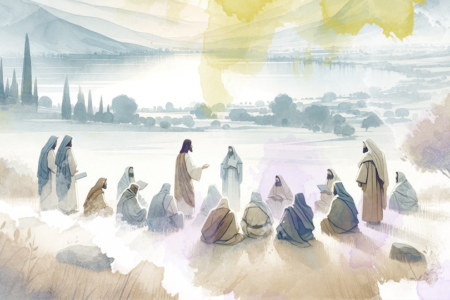The Glory of God Dec/Jan 1976/1977
THE BIG LIE
This is an age of humanism. Men are trying desperately to deny God and to deify man. The truth of God is being rejected for a lie, and men are worshipping and serving the creature rather than the Creator (Rom. 1:23, 25).
What is the cure for this loss of awe, reverence and fear of God? Biblical history demonstrates that the surest way to instill a proper attitude toward God is to confront men with the glory of God.
THE MEANING OF GLORY
What is the glory of God? The most basic and frequently used word for “glory” in the Old Testament is kabod. The root idea involved in this word is this: that which is heavy or weighty.1 Thus, the word refers to something weighty concerning a person. It is any manifestation, possession, quality or action of a person that causes him to carry weight with others. It is that which is impressive and demands recognition, that which gives a person influence, that which sets him apart and distinguishes him from others. For example, Jacob’s great wealth and Joseph’s powerful position as an official of Egypt are called their glory (Gen. 31:1; 45:13). These were the things that gave these men influence and recognition and that impressed their contemporaries.
In light of this meaning of “glory”, the following conclusion can be drawn concerning the glory of God. The glory of God is any manifestation, possession, quality or action of God that causes Him to carry weight or have influence with His creatures. It is that which demands their recognition of God, that which impresses them with His greatness and that which sets Him apart, declares His uniqueness and distinguishes Him as the only true God. Because God’s glory sets Him apart from all others and declares His uniqueness, He refuses to share His glory with others (Isa. 42:8; 48:11).
THE MANIFESTATIONS OF THE GLORY OF GOD
Historically God has manifested His glory in at least four different ways. The first way is through His creation. David wrote: “The heavens declare the glory of God; and the firmament sheweth His handywork” (Ps. 19:1). In other words, the great universe in which we live testifies concerning the great wisdom and power of its Creator.
Are you impressed with the greatness of God as you gaze at the magnificent star-studded heavens on a clear night? If not, perhaps some statistics concerning the universe will help you to be impressed. Are you aware of the fact that the planet Earth upon which we live weighs over 6,600 quintillion tons (6,600 with eighteen zeros after it)?2 The Earth is huge in contrast with each human being. But in contrast with the sun of our solar system, the Earth is so small that it would take 1,300,000 earths to match the volume of the sun.3 The sun is enormous, and yet it is one of the smallest stars in our galaxy. Another star, Antares, occupies 90 million times as much space as our sun and is 390 million miles in diameter.4 In spite of its great size, Antares is only one of approximately 100 billion stars in our galaxy.5 Our galaxy is so gigantic that it takes 100 thousand years for light, traveling at the rate of 186 thousand miles a second, to move from one end to the other.6 In addition, it is so thick that five to ten thousand years are needed for light to travel from the top to the bottom.7 In spite of its vastness, our galaxy is only one of approximately one billion galaxies that have been photographed thus far.8
Why is the universe so overwhelmingly enormous? God designed and created it that way for one purpose: to impress His creatures with His greatness. David declared that the glory of God far exceeds the glory of the heavens. Indeed, God is so much greater than the magnificent universe that He created, that He has to humble Himself to pay attention to it (Ps. 113:4, 6). As a result of observing the vastness of the universe, man should be impressed with the infinity of God and the finiteness of himself. David expressed such an impression: “When I consider thy heavens, the work of thy fingers, the moon and the stars, which thou has ordained; What is man, that thou art mindful of him? and the son of man, that thou visitest him?” (Ps. 8:3-4).
The second way that God has manifested His glory is through unique historic events that could be caused only by His supernatural intervention. For example, God Himself broke the back of the mighty Assyrian army by supernaturally destroying 185,000 of its soldiers in one night when it threatened Jerusalem during the reign of King Hezekiah of Judah (2 Kings 19:35). God did this for His own sake (2 Kings 19:34) to impress all the kingdoms of the world with the fact that Jehovah alone is God (2 Kings 19:19).
The third way that God has manifested His glory is through the nation of Israel. In Isaiah 46:13 God assigned the folIowing title to the nation: “Israel my glory”. Indeed, God said of Israel: “I have created him for my glory” (Isa. 43:7), and “in Israel He shows forth His glory” (Isa. 44:23, NASB).
How does God manifest His glory through Israel? He does it through His dealings with the nation. Early in Israel’s national history Moses promised the Israelites that if they would heed God’s Word and obey Him, He would do the following for them:
The LORD thy God will set thee on high above all nations of the earth (Deut. 28:1); . . . The LORD shall cause thine enemies that rise up against thee to be smitten before thy face: they shall come out against thee one way, and flee before thee seven ways (Deut. 28:7); . . . the LORD shall make thee the head, and not the tail; and thou shalt be above only, and thou shall not be beneath (Deut. 28:13).
Moses also promised that, if the Israelites rejected God’s Word and disobeyed Him (Deut. 28:15), then the following would happen to them:
The LORD shall send upon thee cursing, vexation, and rebuke, in all that thou settest thine hand unto for to do (Deut. 28:20); . . . Therefore shalt thou serve thine enemies which the LORD shall send against thee (Deut. 28:48); . . . the LORD shall scatter thee among all people, from the one end of the earth even unto the other; . . . And among these nations shalt thou find no ease, neither shall the sole of thy foot have rest: but the LORD shall give thee there a trembling heart, and failing of eyes, and sorrow of mind: And thy life shall hang in doubt before thee; and thou shalt fear day and night, and shalt have none assurance of thy life (Deut. 28:64-66).
When God would bless Israel above all other nations in return for her heeding and obeying His Word, the result would be as follows: “So all the peoples of the earth shall see that you are called by the name of the LORD; and they shall be afraid of you” (Deut. 28:10, NASB). When God would chasten Israel more severely than other nations in return for her rejecting and disobeying His Word, this would be the result: “And thou shalt become an astonishment, a proverb, and a byword, among all nations whither the LORD shall lead thee” (Deut. 28:37); “. . . And they shall be upon thee for a sign and for a wonder” (Deut. 28:46).
These statements by Moses indicate that God manifests His glory through Israel by making that nation an object lesson to the rest of the world. His dealings with Israel are designed to impress man with at least two facts concerning God. First is the fact that God blesses in a unique way those who belong to Him and who hear and obey His Word. Second is the fact that God will judge severely those who reject and disobey His Word.
The fourth way that God has manifested His glory is fire. The glory-fire of God took various forms, but most frequently it appeared as a pillar of fire veiled in a pillar of cloud (Ex. 16:10).
There were times when the glory-fire of God appeared only on rare occasions. However, once God began to lead Israel from Egypt and became united with Israel through the Mosaic Covenant, His glory-fire remained with the nation continuously for centuries (Ex. 13:21-22).
THE SIGNIFICANCE OF THE GLORY-FIRE OF GOD
Whenever the glory-fire appeared it was a sign that God was present in a special sense in that place at that time. For example, when the fire descended upon Mount Sinai, it was a sign that God was present there in a special sense to enter into covenant relationship with Israel (Ex. 19).
Because the glory-fire remained with Israel continuously after her deliverance from Egypt, and because it signified the presence of God, through time it became known as the Shekinah Glory of God. The term Shekinah is derived from a word which means “to dwell” or “to live with”.9
The glory-fire signified two different things concerning the special presence of God. Sometimes it signified that God was present to judge. For example, God’s glory-fire appeared when He judged Israel for lack of faith at Kadesh-barnea (Num. 14:10). In light of this signification of the glory-fire of God, it is not surprising that Moses said that “God is a consuming fire” (Deut. 4:24).
On other occasions the glory-fire signified that God was present to administer grace. To illustrate, God’s glory-fire was present when He commissioned Moses to lead Israel out of its Egyptian bondage (Ex. 3:2-6).
THE EFFECTS OF THE GLORY-FIRE OF GOD
The glory-fire of God has had interesting effects upon people and things. Its appearance in the burning bush made the surrounding land holy and caused Moses to hide his face in fear (Ex. 3:2-6). It protected the Israelites and discomfited the Egyptian chariot force at the Red Sea (Ex. 14:19-25). Mount Sinai quaked greatly and burned and was engulfed by flashes of lightning and loud claps of thunder when the glory-fire descended upon it (Ex. 19:16-18; Deut. 5:23; 9:15). It caused the Israelites to withdraw out of fear of being consumed (Ex. 20:18-21; Deut. 5:5, 23-26; 18:16). It made Moses’ face glow with such brilliant radiance after he descended from Mount Sinai that he had to veil his face for the sake of the Israelites (Ex. 34:29-35). It sanctified the Tabernacle (Ex. 29:43) and made it impossible even for Moses to enter that structure for awhile (Ex. 40:33-35). The presence of the glory-fire on the mercy seat in the most holy place of the Tabernacle necessitated a veil between the most holy place and the holy place lest people be stricken dead (Ex. 26:33-34; Lev. 16:2). When glory-fire appeared and consumed sacrifices that had been offered to God, the Israelites shouted and fell on their faces in fear (Lev. 9:23-24).
While the glory-fire remained in Solomon’s Temple in Jerusalem, that structure and city were protected from destruction by the Gentiles. However, once the glory-fire departed because of Israel’s rejection of God (Ezek. 8-11), the Temple and Jerusalem were exposed to total destruction by the Babylonians in 586 B.C. This departure of the glory-fire signified the withdrawal of God’s protective presence (Jer. 52:3).
In light of the significance and effects of the glory-fire of God, it can be concluded that God designed the glory-fire to impress man with two aspects of His nature: His unapproachable holiness and terrifying power.10 God uses that terrifying power to administer both judgment and grace.
THE GLORY-FIRE OF GOD IN THE NEW TESTAMENT
Nowhere in the Old Testament record did the glory-fire of God inhabit human flesh. This changed, however, with Jesus of Nazareth. The Apostle John wrote of Him: “And the Word became flesh, and dwelt (literally, “tabernacled”) among us, and we beheld His glory, glory as of the only begotten from the Father, full of grace and truth” (John 1:14, NASB). When did John see the glory-fire of God in the flesh of Jesus of Nazareth? He saw it when Jesus was transfigured before him, Peter and James (Matt. 17:1-6). In the transfiguration, Jesus’ flesh radiated a brilliant light (v. 2). At the same time a bright cloud appeared overhead, and the voice of God spoke from that cloud (v. 5). John, Peter and James would know from their nation’s history that the bright cloud was none other than the glory-fire of God veiled in a cloud – the same manifestation of God that appeared to Israel in Old Testament times. As these men compared the brightness of the cloud with the brilliance of Jesus’ flesh, they recognized that these two were the same.
Two reactions of the disciples indicate that they identified the brilliance of Jesus’ flesh with the glory-fire of God. First, Peter suggested the building of a tabernacle for Jesus (v. 4). Remembering that the glory-fire of God was housed in the Tabernacle in Israel’s past history, he was suggesting that that same glory-fire in Jesus also be housed in a tabernacle. Second, the disciples fell on their faces and were sore afraid at the transfiguration of Jesus (v. 6). As noted earlier, this also was the reaction of the Israelites when they saw the glory-fire of God in Old Testament times.
What did the embodiment of the glory-fire of God in Jesus’ flesh indicate concerning Him? It indicated that Jesus was God incarnate in human flesh. Just as the appearance of the glory-fire of God in the Old Testament Tabernacle and Temple always signified that God Himself was specially present to dwell or tabernacle in the midst of the people of Israel, so the appearance of the glory-fire of God in Jesus’ flesh signified that once again God Himself was specially present to dwell or tabernacle in the midst of His people Israel. This time, however, He was tabernacling in human flesh, not in a building made by human hands.
In light of this significance of the glory-fire of God in Jesus’ flesh, several statements concerning Him were very appropriate. Matthew said that in fulfillment of Isaiah 7:14 Jesus would be called Immanuel, which means “God with us” (Matt. 1:23). A devout Jew named Simeon called Him: “A light to lighten the Gentiles, and the glory of thy people Israel” (Lk. 2:32). Referring to Jesus, John said: “and the Word was God . . . And the Word became flesh, and dwelt (literally, “tabernacled”) among us, and we beheld His glory” (John 1:1, 14, NASB). Jesus called Himself “the light of the world” (John 8:12) and His body a temple (John 2:19, 21). Paul designated Him “the Lord of glory” (1 Cor. 2:8) and said that “He is the image of the invisible God” (Col. 1:15, NASB) and that “in Him all the fullness of Deity dwells in bodily form” (Col. 2:9, NASB). The writer of Hebrews declared that Jesus “is the radiance of” God’s “glory and the exact representation of His nature” (Heb. 1:3, NASB).
The glory-fire of God played another significant role in New Testament times. After the death, resurrection and ascension of Jesus, His believers waited in Jerusalem to receive the Holy Spirit in accordance with Christ’s instructions (John 7:39; 14:16-17; Acts 1:4-5). As they were assembled together on the Day of Pentecost, a unique thing happened:
And suddenly there came from heaven a noise like a violent, rushing wind, and it filled the whole house where they were sitting. And there appeared to them tongues as of fire distributing themselves, and they rested on each one of them (Acts 2:2-3, NASB).
This fire was the glory-fire of God.11 Instead of being in the form of a pillar, it was divided into as many segments as there were believers present. Just as in Old Testament times the appearance of the glory-fire always signified the special presence of Deity to dwell in the midst of His people, so its appearance on Pentecost signified that Deity, namely the Holy Spirit, was coming to dwell in the midst of the believers. The fact that the glory-fire divided into segments and rested on each believer signified that the Holy Spirit was coming to indwell the body of every believer. This unique appearance of the glory-fire of God marked the beginning of the Holy Spirit’s permanent residence in believers’ bodies.
In light of this significance of the glory-fire on Pentecost, note the implication of Paul’s statements to believers:
Do you not know that you are a temple of God, and that the Spirit of God dwells in you? If any man destroys the temple of God, God will destroy him, for the temple of God is holy, and that is what you are (1 Cor. 3:16-17, NASB).
Or do you not know that your body is a temple of the Holy Spirit who is in you, whom you have from God, and that you are not your own? For you have been bought with a price: therefore glorify God in your body . (1 Cor. 6:19-20, NASB).
Just as the Old Testament Temple was made holy or sanctified (set apart as belonging only to God) by the indwelling presence of Deity, as signified by the pillar of glory-fire, so the body of the believer has been made a holy or sanctified temple of Deity. It has been set apart as belonging only to God by the indwelling presence of the Holy Spirit as signified by the tongues of glory-fire. Just as Deity began to indwell the Temple when the glory-fire appeared at that structure on the day of its dedication, so Deity began to indwell the bodies of believers when the glory-fire appeared on such bodies on the Day of Pentecost.
Paul indicated that the believer has the responsibility of glorifying God in his body, since it is a holy temple of God. This means that the believer is to use his body in such a way that men will be impressed with the holy moral nature of God, of which nature the believer partakes (2 Peter 1:4). In the same vein, Jesus said to His believers: “You are the light of the world . . . Let your light shine before men in such a way that they may see your good works, and glorify your Father who is in heaven” (Matt. 5:14, 16, NASB).
In light of the association of the Holy Spirit with the glory-fire resting on believers on Pentecost, it is interesting to note that Peter calls the Holy Spirit “the Spirit of glory” and says to believers: “the Spirit of glory and of God rests upon you” (1 Pet. 4:14, NASB).
CONCLUSIONS
Because God is the “God of glory” (Acts 7:2), man is exhorted to ascribe glory to Him (1 Chron. 16:28-29; Ps.96:7-8). This can be done by declaring to Him and others what manifestations, qualities, possessions and actions of God impress one with Him.
Every person has his own glory, those qualities which make him unique from everyone else. However, only God is the “King of glory” (Ps. 24:7-10). Only He and His glory are perfect, infinite and supreme. All human beings have sinned and fallen short of His glory (Rom. 3:23).
This sin and failure on the part of man have separated him from God and subjected him to His terrifying judging power. However, since Jesus, the Lord of glory, died for our sins, was buried and rose again from the dead, those who place their faith only in Him for salvation receive a perfect standing before God. As a result, God is able to make the believer “stand in the presence of His glory blameless with great joy” (Jude 24, NASB). But those who do not believe in Jesus will find that the God of glory is a consuming fire. In light of the glory of God, it is most urgent that you trust Jesus as your only Saviour now.
ENDNOTE
- Francis Brown, S. R. Driver and Charles A. Briggs, A Hebrew and English Lexicon Of The Old Testament (New York: Houghton, Mifflin and Company, 1906), p. 457.
- Sir James Jeans, The Universe Around Us (Cambridge: The University Press, 1960), p. 42.
- Peter Lancaster Brown, Astronomy in Color (New York: The MacMillan Company, 1972), p. 43.
- Jeans, The Universe, p. 181.
- Brown, Astronomy, p. 218.
- Ibid.
- Ibid.
- Patrick Moore, The Observer’s Book of Astronomy (New York: Frederick Warne & Co., 1962), p. 148.
- J. Barton Payne, The Theology of the Older Testament (Grand Rapids: Zondervan Publishing House, 1962), p. 361.
- Walter Eichrodt, Theology of the Old Testament (Philadelphia: The Westminster Press, 1961), p. 18.
- J. Dwight Pentecost, unpublished class notes on Acts, Dallas Theological Seminary, 1962.







